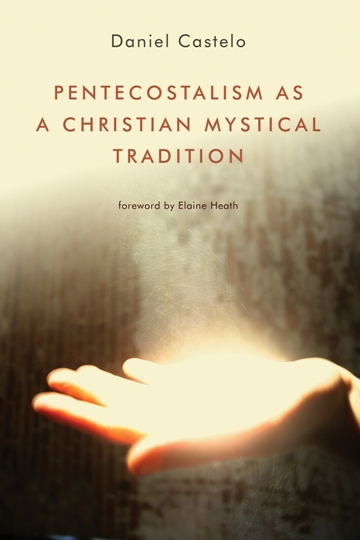Daniel Castelo: Pentecostalism as a Christian Mystical Tradition
 Daniel Castelo, Pentecostalism as a Christian Mystical Tradition (Grand Rapids, MI: William B. Eerdmans Publishing Co., 2017), 194 + xx pages, ISBN 9780802869562.
Daniel Castelo, Pentecostalism as a Christian Mystical Tradition (Grand Rapids, MI: William B. Eerdmans Publishing Co., 2017), 194 + xx pages, ISBN 9780802869562.
In this book, Daniel Castelo’s main goal is to show how Pentecostalism “is decisively not a Protestant tradition generally” and “not part of contemporary evangelicalism particularly” (p. xiii). He moreover argues that pentecostal identity, spiritualty, and theological development are diminished when these foci are largely subsumed under Evangelicalism (p. xiv). He thus suggests that Pentecostalism “is best framed as a modern instantiation of the mystical stream of Christianity” (pp. xv-vi). Hence, “Pentecostalism is best understood as a mystical tradition of the church catholic” (p. xvi). Castelo thus argues that rather than immediately looking to contemporary Evangelicalism, Pentecostals can find far more congruent resources for articulating their identity, spirituality, and theology, in the historical Christian mystical tradition. In the Postscript, Castelo well summarises his purpose for this book: “Its aim has been to facilitate a theological exercise of rethinking Pentecostalism in light of mystical categories for the sake of deepening the connections of this movement within wider Christianity and also as a way of differentiating it from forms of reasoning typically associated with American evangelicalism” (p. 177).

Daniel Castelo
Besides the Introduction and Postscript, the book comprises five chapters. By framing the book’s thrust “within the domains of theological method and epistemology” (p. 1), in Chapter One (“The Challenge of Method”) Castelo substantiates his aims by demonstrating their resonance with past and ongoing pentecostal scholarship that has conceived Pentecostalism as a “spirituality” (pp. 1-6). Castelo devotes Chapter Two (“A Mystical Tradition?”) to identifying thematic aspects of the historic Christian mystical tradition which he believes are most congruent to pentecostal experience and spirituality. Here he argues that convergence can be seen between the pentecostal stress on “encountering God” as the aim of their liturgical practices (pp. 80-83) and the historic mystical stress on movement towards “union” with God (pp. 44, 55-57, 80-82). In Chapter 3 (“The Epistemological Form of Evangelical Theology”), Castelo argues the incongruence of contemporary Evangelicalism’s theological methodological approaches as a ready resource for pentecostal theological method, insofar that Evangelicalism continues its epistemological embedding within its fundamentalist-foundationalist heritage (p. 125).
“Pentecostalism is best understood as a mystical tradition.”
It should be seen that in many ways, Castelo’s functions as a follow-up to themes and aims earlier pursued by Simon Chan in his book, Pentecostal Theology and the Christian Spiritual Tradition (Sheffield, 2000). Castelo in fact devotes a section to Chan’s earlier work (pp. 154-157). What primarily differentiates Castelo’s book from Chan’s earlier work however, is the greater analytical depth he gives towards explicating incongruence between pentecostal and contemporary evangelical (particularly North American) epistemological and theological-methodologies. Unfortunately, on this topic (chapter 3), his argumentation is quite dense and seemingly over repetitive.


